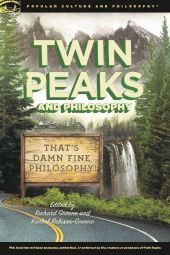 Neuerscheinungen 2018Stand: 2020-02-01 |
Schnellsuche
ISBN/Stichwort/Autor
|
Herderstraße 10
10625 Berlin
Tel.: 030 315 714 16
Fax 030 315 714 14
info@buchspektrum.de |

Rachel Robison- Greene, Richard Greene, Rachel Robison-Greene
(Beteiligte)
Twin Peaks and Philosophy
Thatīs Damn Fine Philosophy!
Herausgegeben von Greene, Richard; Robison-Greene, Rachel
2018. 256 S. 9.00 in
Verlag/Jahr: INGRAM PUBLISHER SERVICESBOOKS; OPEN COURT 2018
ISBN: 0-8126-9981-5 (0812699815)
Neue ISBN: 978-0-8126-9981-4 (9780812699814)
Preis und Lieferzeit: Bitte klicken
An investigative team of philosophers uncovers the hidden meanings of this weird and puzzling television show.
2017 saw the triumphant return of the weird and haunting TV show Twin Peaks, with most of the original cast, after a gap of twenty-five years. Twin Peaks and Philosophy finally answers that puzzling question: What is Twin Peaks really about?
Twin Peaks is about evil in various forms, and poses the question: Whatīs the worst kind of evil? Can the everyday evil of humans in a small mountain town ever be as evil as the evil of alien supernatural beings? Or is the evil of non-humans actually less threatening because itīs so strange and unaccountable? And does the influence of uncanny forces somehow excuse the crimes committed by regular folks? Some Twin Peaks characters try to confine evil by sticking to their own moral code, as in the cast of Albert Rosenfeld, who refuses to disguise his feelings and upsets everyone by his forthright honesty.
Twin Peaks is about responsibility, both legal and moral. Who is really responsible for the death of Laura Palmer and other murder victims? Although Leland has been revealed as Lauraīs actual killer, the show suggests that no one in town was without some responsibility. And was Leland even guilty at all, if he was not in control of his own mind or body?
Twin Peaks is about the quest for self-knowledge and the dangers of that quest, as Agent Cooper keeps learning something new about himself, as well as about the troubled townspeople. The Buddhist Cooper has to confront his own shadow side, culminating in the rite of passage at the Black Lodge, at the end of Season Two.
Twin Peaks is about madness, sanity, the borderline between them, and the necessity of some madness to make sense of sanity. The outwardly super-normal if somewhat eccentric Agent Dale Cooper is the inspired, deranged, and dedicated shaman who seeks the truth by coming to terms with the reality of unreason, partly through his dreams and partly through his existential encounters with giants, logs, outer space, and other unexpected sources. Cooper challenges official law enforcementīs over-reliance on science.
Twin Peaks is about the imagination run wild, moving from metaphysics to pataphysics-the discipline invented by Alfred Jarry, which probes the assumption that anything can happen and discovers the laws governing events which constitute exceptions to all laws.
Greene, Richard Richard Greene is Professor of Philosophy at Weber State University in Utah. He is co-editor of many volumes in the Popular Culture and Philosophy series, the most recent being Orphan Black and Philosophy .
Robison-Greene, Rachel
Rachel Robison-Greene is co-editor of Dexter and Philosophy and Orange Is the New Black and Philosophy . She is currently a Ph.D. Candidate in Philosophy at the University of Massachusetts Amherst.


